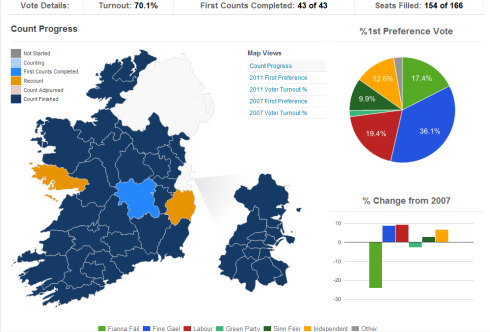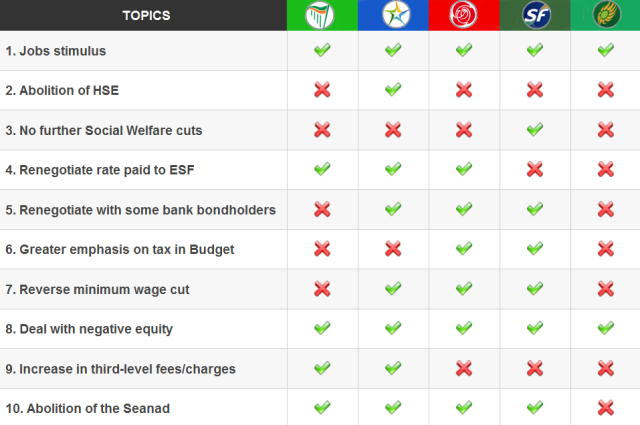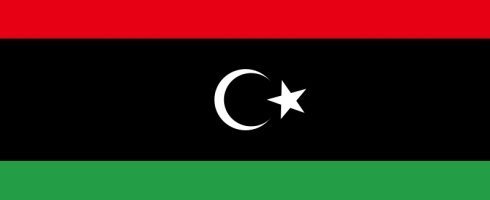
Originally, the election was scheduled for 11 March. However, the Irish Green Party pulled out of the coalition government with Fianna Fáil in January, resulting in a Snap Election. The former coalition had a 2 seat majority in the Dáil, which by any standards is not much, and with the amount of animosity toward the government and the Taoiseach (Prime Minister), the Greens tried to save face and distance themselves from Taoiseach Brian Cowen. Mr Cowen has resigned as leader of Fianna Fáil, which means that after the election on Friday, Mr Cowen will no longer be an Taoiseach, even if Fianna Fáil (by an act of God), wins the election and if he is re-elected to his position as a TD (MP). All the animosity comes from the economic crisis and the EU/IMF bailout and the austerity measures that have come with it, such as cutting pay and pensions by ten per cent, including those already receiving a pension, cutting minimum wage by €1, making redundancies across state services including education, health care, transportation, post, police, etc.
Current Poll Results:
- Fine Gael : 36.1% 70 seats
- Labour/ Lucht Oibre: 19.4% 36 seats
- Fianna Fáil : 17.4% 18 seats
- Sinn Féin : 9.9% 13 seats
- Greens / Glas : 1.8% 0 seats
- Independents: 12.6% 13 seats
- Other / Eile: 2.6% 4 seats
Language Politics
While in the United States, language politics usually refers to whether to make English (or American, depending on who you talk to) the official language of the nation, in Ireland, language politics refers to the status and use of the Irish Language (Gaeilge) by the State, Schools, and Media. Of all the major parties, Fine Gael’s language policies seem to be least favourable to the Irish language, with a main feature being to terminate compulsory Irish in Secondary Education and Leaving Cert Exams (Leaving Cert is similar to AP exams but has the impact of the ACT/SAT in terms of applying to university). In Ireland, the constitution states that Irish is the First Official Language and English is the other. Labour Policies are more favourable to the language, so most Irish-Language supporters will vote for Labour or Sinn Féin. For more Irish-Language News, visit Nuacht 24 or TG4.
On the plus side though, TG4, the country’s only Irish-Language television station, hosted the first general election debate in Irish since the founding of the free state. The link to the debate is here:http://www.rte.ie/news/election2011/tg4_leaders_debate_embed_player.html. Don’t worry, it is subtitled in English.
Comparing the Manifestos
RTÉ put together a great chart of where the five major parties stand on the ten most important issues facing and concerning most of the public. It goes in order of Fianna Fáil, Fine Gael, Labour, Sinn Féin, and the Green Party.
To clarify some thing for those unfamiliar with Ireland’s current political culture, Some of the acronyms used in here mean:
- HSE – Health Service Executive. Similar to the NHS in England, this is a government-run service that runs the hospitals and acts as the state insurance provider (which is very basic). While Finn Gael wants to abolish the Health Service Executive, it does not want to fully privatize the health services in Ireland, but rather restructure the services and break up the HSE.
- ESF stands for the European Social Fund, which is like an intra-EU Red Cross
- Third-level fees are university tuition rates, per year. There are two rates for a undergradute programme: A National/EU rate and International Non-EU rate, the latter being more expensive.
- Seanad is just Irish for Senate. It’s powers are similar to the House of Lords in the United Kingdom, except they have no judicial power. They are elected officials.
Full Manifestos
For full party manifestos, visit:
- Sinn Féin Manifesto
- Fine Gael Manifesto
- Labour / Lucht Oibre Manifesto
- Fianna Fáil Manifesto
- Green / Glas Manifesto
Election Results
Counting is almost done, with votes still being counted in Galway East and Wicklow. Sinn Féin saw more gains than they expected, now with 13 seats in the Dáil instead of the 5 that were elected in 2007. Also independents and other parties, especially far-left parties saw big gains, such as the Socialist Party. The Green Party has been completely wiped out of the Dáil, and while Dublin used to be a Fianna Fáil strong hold, now only has one Fianna Fáil TD, former Minister of Finance Brian Lenihan.








